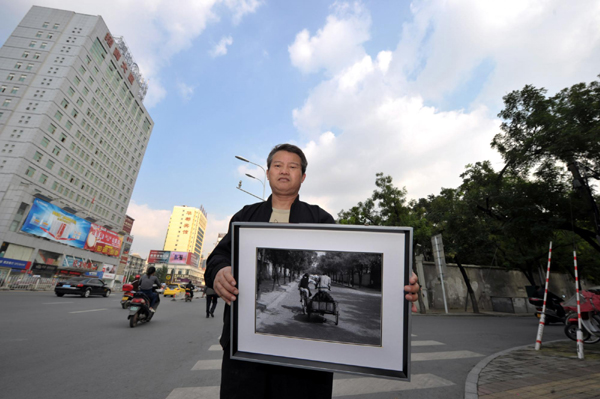News
Photographs kindle nostalgia for National Days past
(Xinhua)
Updated: 2010-10-02 16:12
 |
Large Medium Small |
|
 |
| Jia Deyi shows his favorite National Day photo [Photo/Xinhua] |
Their pictures tell the story of a nation through the lens of ordinary people.
Laughter in black and white:
Jia Deyi, 80, a resident of Hefei city in Anhui province, has carried with him a camera almost everyday, recording the vicissitudes of life in this age-old city.
"The man was riding slowly on a carrier tricycle full of briquettes," says Jia. "The woman was on a bicycle helping her husband push the briquettes by holding the handle bar of the carrier with one hand.
"They were talking and laughing and their figures were gilded by the golden autumn sunshine," Jia recalls. "I couldn't help but hold my breath, and press the shutter."
In the picture, the sun illuminates the leaves of the camphor trees lining the street; pedestrians in the background walk in the soft light.
"They are bygone days," Jia sighs. "Twenty years ago when there was no coal gas or natural gas, we used coal stoves everyday. The smoke from burning coal was choking.
"We used ration coupons to buy coal and other daily necessities. The people in this picture are dressed in plain white shirts and black trousers, which was common in the 1980s. You had few choices when buying clothes at that time as resources were still scarce."
Monthly ration coupons were common in the China of the planned economy from the early 1950s to the mid-1980s. The government allocated coupons for daily necessities, such as grain, oil, sugar, salt and clothes.
The market-oriented reforms that began in 1978 allowed farmers a free hand and encouraged private investment in light and service industries. Supplies of food and other daily necessities became abundant and coupons gradually became worthless later in the 1980s.
Today, the camphor trees in Shucheng Street are taller, and the bustling traffic and shops have transformed the black and white serenity into a flicker of vitality and prosperity.
Class reunion:
The highlight of the National Day holiday for Liu Min, 35, a worker at a foreign company, is her 15th college reunion at a Hefei restaurant.
To the melody of "Auld Lang Syne," a short film composed of old pictures is played, throwing graduates back to their school days.
In one picture, a boy with microphone sings in front of a TV set. On the blackboard behind him, a line written with colored chalk reads "1995 National Day Karaoke Competition."
"We borrowed the TV set, stereo, video recorder and microphone from the school, and students of other classes envied us," Liu recalls.
"Now, the city has karaoke bars everywhere and the boy in this picture owns his own business and is busy flying from one place to another."
To Liu's disappointment, many classmates failed to come to the reunion.
"Some are too busy with their work and others just want to have an undisturbed National Day holiday staying at home and enjoying a break from the hustle and bustle of work."
A child's wish:
Eleven-year-old Xu Huan has been looking forward to this National Day holiday for months.
Xu lives with her grandparents in a village near Huaibei city, Anhui province. She is going to Shanghai to spend the holiday with her parents where they are construction workers.
"I don't have any pictures taken in the National Days. My only memories of the holiday are staying at home with my grandparents and doing my homework," Xu says.
"I'll go to the World Expo with my parents. We'll take a lot of photos," Xu says. "I'll show the photos to my grandparents and tell them stories of Shanghai and I'll look at the pictures whenever I miss my parents."
Xu is one of the "left-behind children," children who live in the countryside with their grandparents or other relatives because their parents have gone to the cities in search of better salaries.
About 58 million left-behind children live in China's countryside, according to a survey by the All-China Women's Federation in 2008. The number is almost triple that recorded in the government's 2000 census.
Xu has a special gift for her parents -- an examination paper bearing a full score.
"It's been more than a year since I last saw my parents," Xu says. "I want to let them know that I've been doing very well in school."



